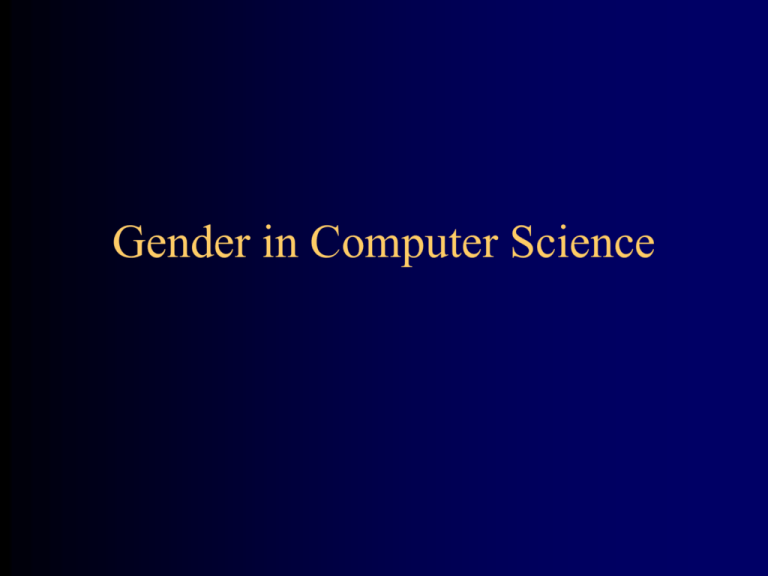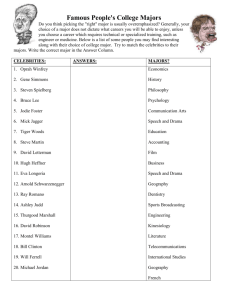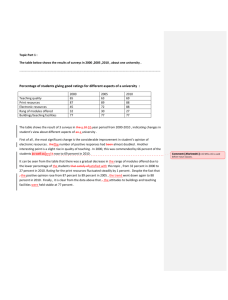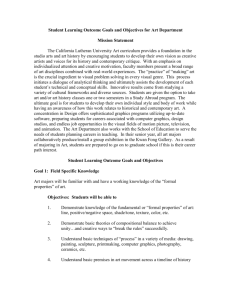Gender issues - the Department of Computer and Information Science
advertisement

Gender in Computer Science SIGCSE • SIGSCE is the Special Interest Group in Computer Science Education • I’ve just returned from the annual conference • A common theme, this year and every year, is attracting women to computer science--and keeping them • Many of these same comments apply to other minorities • I am very interested in this problem What I can do • Not much :( • Most losses occur during the second year • I can give you: – some facts and figures – some research results – some opinions Figures • Enrollment in computer science programs reached a peak in 1986, then declined until 1996 – There has been an upward trend from 1996 to 2000 – We don’t have figures past 2000 • In 1986, female enrollment reached a peak of 40% • During the period 1986 to 1996: – Men majoring in computer science dropped by 33% – Women majoring in computer science dropped by 55% – Other minorities also dropped by larger amounts than white males • Why? Myths • Both men and women incorrectly believe that men in CS have higher GPAs than women – Fact: There is no difference in GPAs – Fact: In my MCIT program, there is no gender difference in GREs of admitted students • Women who succeed in CS are often viewed as “exceptional” – Fact: Women and men are equally capable • Both groups do equally well on assignments • Both groups do equally well on examinations – Fact: Women do not have to be “better than men” to succeed Myths II • Myth: Some people just have a “computer gene” – Fact: From a biological standpoint, it’s obvious that there is no such thing – Fact: As with anything, there are individual differences in ability • It is commonly believed (among teachers) that anyone can be taught to program – Fact: If you work hard, you will succeed • No one is born with these skills – Fact: Many computer “hotshots” aren’t really very good – My belief: There is a positive feedback loop between enjoying an activity and being good at it Myths III • Computer programming is for “loners” and is basically an antisocial (or at least nonsocial) activity – Fact: Prospective employers shun loners and look for people who work well with others – Fact: Large programs are group efforts – Fact: Most programming methodologies are about how to best organize the programming team – Fact: In an educational setting, we typically insist on individual effort, mostly in an attempt to grade fairly-but this does not reflect “real world” practice Stereotypes • Stereotype: Computer science majors are intelligent but lack interpersonal skills – Fact: Like all stereotypes, there are individuals who fit the stereotype--but most do not • Stereotype: Successful computer science majors “don’t have a life” but spend all their time at the computer – Fact: Almost all computer scientists do have a life – Fact: However, CS majors do spend significantly more time on schoolwork than non-CS majors – In my personal experience: Obsessive programmers are less likely to succeed Gender NON-differences • Research results show no significant differences between men and women in: – – – – – College GPA ACT math, science, and composite scores Interest in majoring in CS Belief that CS is a worthwhile major Number of hours per week spent on schoolwork • But: CS majors spend more time than non-majors – Age of first computer use – Knowledge of what CS is all about More gender NON-differences • Estimate of how many hours computer scientists work – But: Differences in estimated compensation – Fact: Women are, on average, not as well paid as men – Fact: The difference is much less in the computer field • Importance placed on having a family • Belief that family life and career would be compatible for women • Stress level • Support and encouragement from others • Self esteem Real gender differences • Research results show these statistically significant differences – Men have higher educational aspirations – Men value extrinsic rewards (e.g. money) more – Men are higher in aggressiveness and dominance • But: No difference in kindness or nurturing – Biggest difference: Men are more confident of their own ability Confidence • Confidence in ability to write a computer program: – Students with high math ACT scores • Male CS majors: 63% • Male non-CS majors: 60% • Female CS majors: 48% • Female non-CS majors: 44% – Students with low math ACT scores • Male CS majors: 53% • Male non-CS majors: 49% • Female CS majors: 37% • Female non-CS majors: 34% Especially interesting: High-scoring female CS students vs. low-scoring male non-CS students Why women drop out • According to one study, females suffer a loss of interest in the field, preceded by a loss of selfconfidence • Probable causes of loss of confidence: – Inaccurate belief that women have lower ability – Lack of awareness of excellent income opportunities – Conflict between a woman’s view of herself and (inaccurate) stereotype of “computer nerds” – “Stereotype threat”: Fear of confirming the stereotype – Less playful and relaxed attitude toward computers Factors undermining self confidence • (Note: These are opinions, not research results) • Computer science is hard--everyone has difficulty • Men are less willing than women to admit to having difficulties, hence often appear more capable than they really are • The field is wide as well as deep: “You’re a computer science major and you don’t know that?” • In programming, virtually all your mistakes are stupid ones--everyone’s mistakes are stupid ones-and it’s easy to mistake this for a personal failing Interesting tidbits • Percentage of women earning a bachelor’s degree is significantly lower if the CS department is in the College of Engineering rather than in the College of Arts and Sciences • Under-representation of women in CS appears to be a cultural problem – Not true in historically black colleges and universities – Not true in Greece, Turkey, France, Italy • In one study, 30% of self-rated “code warriors” failed an assignment, compared to 15% of “code-a-phobes” Conclusions • These studies suggest that women lose interest in computer science because of: – The mis-perception that they are not as capable as other (especially male) students – The (accurate) perception that they do not conform to the (mostly inaccurate) stereotype of computer “nerds” • The foregoing is presented in the hope that having some actual information on gender differences will help some of you in your college careers The End



